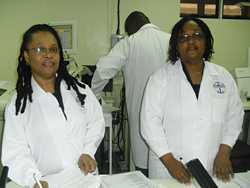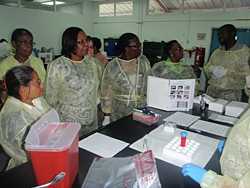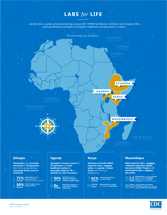Strengthening Laboratory Services and Systems in the Caribbean Region

AFENET staff assessed laboratory strengths and weaknesses and provided onsite mentorship at the Queen Elizabeth Hospital Laboratory in Barbados.
A strong national public health laboratory system is essential for detecting and responding effectively to HIV and other diseases. Yet in the Caribbean Region, which is second to African in the HIV/AIDS burden, laboratory resources declined rapidly when support from the Caribbean Epidemiology Center stopped in 2008.
In 2009, an assessment of Caribbean interagency laboratory needs conducted through the U.S. President’s Emergency Plan for AIDS Relief (PEPFAR) showed that laboratory services and systems in the region did not have the capacity to provide timely and reliable diagnostic support services for national HIV/AIDS treatment and care programs. Essentially no HIV rapid testing was taking place for point-of-care diagnosis, for example, and dried blood spot samples used for early infant diagnosis were being shipped to South Africa for testing. In addition, clinical laboratory monitoring was not being implemented effectively to support HIV/AIDS care and treatment.
To address these weaknesses, the Caribbean Laboratory Working Group collaborated with the African Field Epidemiology Network (AFENET) to implement sustainable, evidence-informed quality improvement activities throughout the region. AFENET is a non-profit organization and networking alliance dedicated to helping Ministries of Health in Africa build strong, effective, sustainable programs and capacity to improve public health systems on the African continent.
In January 2011 the CDC Caribbean Regional Office began working with AFENET, its PEPFAR laboratory implementing partner, to improve the quality of operations in regional laboratories and strengthen referral systems. Working with the national laboratories in Jamaica, Barbados, Bahamas, and Trinidad and Tobago, AFENET conducted assessments to determine system weaknesses and prepared comprehensive action plans for achieving laboratory accreditation. To ensure progress, the CDC office implemented its Strengthening of Laboratory Management Towards Accreditation training program and embedded mentors in these laboratories to help resolve outstanding issues.
“CDC has been a critical partner in supporting the Government of Jamaica in providing accessible healthcare, especially in the development and sustainability of the HIV/AIDS program,” said Dr. Lundie Richards, director of the Jamaica National Public Health Laboratory. He noted that “the training program provided the support needed to prepare the national public health laboratory for accreditation. A team of laboratory leaders have been trained and are now leading the charge in preparing the institution for achieving this goal.”

Laboratory staff were trained to conduct HIV rapid testing and to use dried tube specimen technology, which is important for monitoring the quality of HIV testing.
CDC also implemented strategies for continuous quality assurance to monitor performance in all 12 Caribbean countries. A regional workshop was held to train laboratorians from all the countries to use dried tube specimen technology and participants can now participate in the External Quality Assessment program that monitors the quality of HIV testing in support of HIV prevention, care, and treatment. In addition, more than 110 laboratory staff from all the Caribbean countries were trained to monitor the quality of HIV clinical laboratory testing online and can now implement the quality management systems needed to achieve laboratory accreditation. This includes testing for clinical chemistry, hematology, viral load, CD4, and tuberculosis to support overall patient care and treatment.
Dr. Brian Amour, program director of the HIV and AIDS Coordinating Unit at the Ministry of Health in Trinidad and Tobogo, praised CDC’s efforts. ‘‘CDC’s laboratory strengthening activities, support for surveillance and program monitoring, and sharing of international best practices on HIV prevention interventions has added value to the country-led strategic policy and programming initiatives to halt and reverse the spread of HIV in Trinidad and Tobago,” said Dr. Amour.
In just 10 months, the CDC Caribbean Regional Office and AFENET have had a major impact on strengthening laboratory services and systems in the Caribbean Region. By working closely with laboratory staff in 12 Caribbean countries, CDC has made important strides in setting up integrated laboratory systems to support HIV surveillance, prevention, and care and treatment programs. Ultimately, this work contributes to the larger vision of strengthening national HIV/AIDS programs and improving national capacity to address other public health priorities.
Labs for Life Infographic:

Get email updates
To receive email updates about this page, enter your email address:
Contact Us:
- Centers for Disease Control and Prevention
1600 Clifton Rd
Atlanta, GA 30333 - 800-CDC-INFO
(800-232-4636)
TTY: (888) 232-6348
24 Hours/Every Day - Contact CDC-INFO
 ShareCompartir
ShareCompartir


